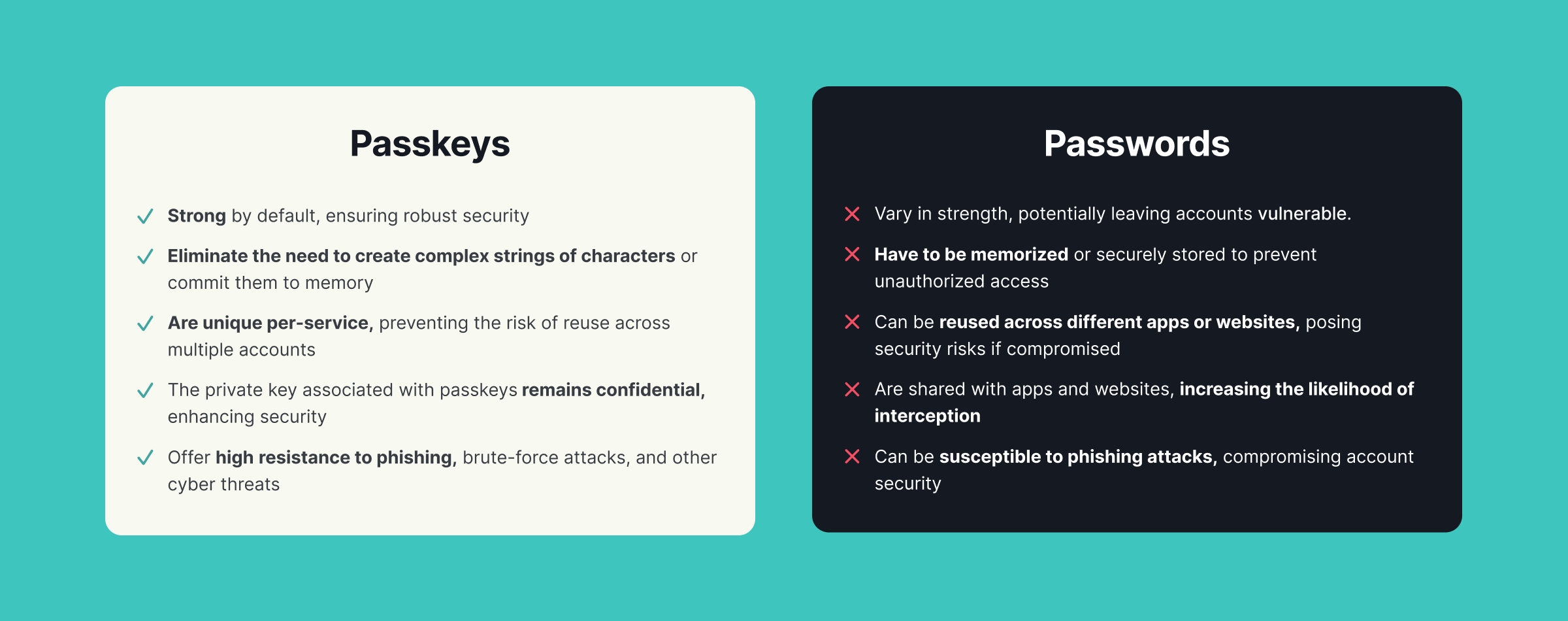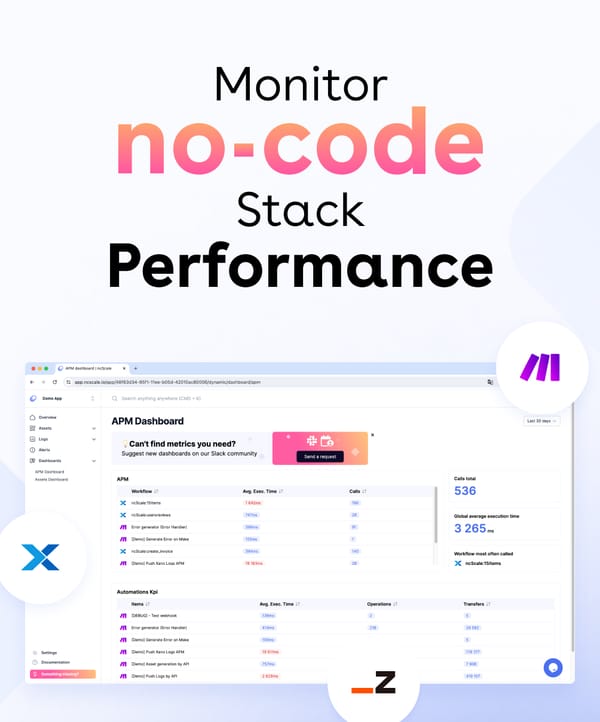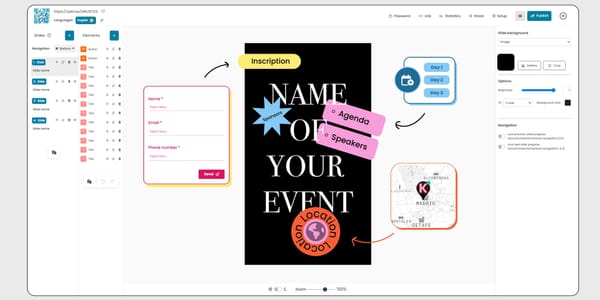It’s impossible to imagine our everyday personal and professional lives without passwords – and all the frustrations they carry. Our reliance on passwords is a double-edged sword. On the one hand, they’re the essential tool to keep private and corporate information secure. On the other hand, lost and stolen passwords are among the leading causes of corporate breaches, causing detrimental financial and immaterial damage to companies worldwide.
In the search for more secure data protection, many companies have been turning toward passkeys – a more robust way of protecting information online without entering a password. While it’s unlikely that passwords will disappear any time soon, passwordless technology is certainly making waves among startups and corporations alike. Let’s see how passwordless security works and how it compares to what we’ve been used to up until now.
Why should startups consider passwordless tools?
While we might think of passwords as “the old reliable,” they are actually a relatively vulnerable security measure. That said, a lot of this vulnerability lies not in the passwords themselves but in how we, as users, handle them.
On average, people handle around 100 online accounts. Think about it – how many of your accounts reuse the same passwords? Add your work accounts to the equation, and password handling gets much more stressful. This leads to simplified yet less secure decisions like coming up with shorter, easier-to-remember passwords for multiple platforms and reusing them for personal and professional accounts alike.
Considering the risk of password-related data breaches, companies have started utilizing measures that protect their passwords directly and provide an additional layer of authentication. To start, two-factor and multi-factor authentication have become the norm for many organizations. Setting up a secondary verification method reduces the risk of passwords being compromised and falling into the wrong hands since employees require another device to confirm their login attempts. Considering that nearly half of all data breaches in 2022 were related to compromised passwords, security reinforcements are a must.
Cryptography is the name of the security game right now, and passkeys are among the biggest players. Compared to passwords, passkeys are nearly impossible to breach as they use cryptographic key pairs to function. If your business uses passwordless authentication for some or all internal accounts, the risk of passwords being breached or stolen decreases significantly.
For startups, switching to more robust passwordless security measures is a strong advantage. It ensures your sensitive company data remains secure and your teams are aware of how they should appropriately handle internal accounts. Furthermore, it helps you build a reputation as a sensible business that cares about its and its clients’ security. In turn, you can build stronger business relationships, grow your business, and stand as a rising star on the startup stage.
The convenience of passkeys can’t be overstated either. Short deadlines and tense planning affect the work pace in startups and established corporations alike. Forgetting or losing a password can cause frustrating disruptions, especially if your team is pressed for time. Switching to passkeys solves this problem – employees no longer have to scramble to find a password for an account that hasn’t been used in months.
You also avoid people creating passwords like “123456” that are simultaneously easy to remember – even topping the lists of the most used passwords worldwide – and just as easily hackable. Instead, with passkeys enabled, all they have to do is authenticate their login credentials using a biometric sensor in their device.
So, how do passkeys work exactly?
Passkeys up close: The new authentication security standard
Passkeys are the rising star of password alternatives. As mentioned, this technology uses public key cryptography and biometric authentication to support secure login authentication for websites and apps.
During the login process with passkeys, the device generates two keys – public and private. The private key is stored in the device, while the public key goes into the website or app’s server. This dual-key technology ensures that passkeys are incredibly difficult to hack – without one key, the other is useless. Even if a cybercriminal were to obtain a company phone that stores the passkey to the internal data storage, they can’t log in without hacking into the website’s servers simultaneously.

Passkeys have proven to be far more resilient to phishing attacks in comparison to passwords. They balance convenience and security – there’s no more need to remember a hundred different passwords because each key is generated automatically. Password managers like NordPass are able to store passkeys in encrypted vaults, adding an extra layer of security to the private key.
That’s not to say that passwords are completely on their way out – many platforms still rely on passwords for access, and throwing all that away to switch to passkeys-only systems is a costly process that needs more substantial time investment to be completed. Besides, passkeys aren’t as broadly adopted as passwords – at least for now. As far as global trends are concerned, passwordless access is expected to see an uptick in 2024. Google, Amazon, Microsoft, Nintendo, PayPal – that’s only a handful of companies that have already enabled passwordless verification on their websites. New platforms are joining this list every day.
Shall your team give passkeys a go?
While passwords are unlikely to fade out of existence any time soon, one thing is certain – passkeys are here to stay. As more and more platforms adopt this authentication method, companies will have more flexibility and control over their security strategies.
For now, passwords and passkeys coexist in tandem. In time, we’ll likely see them switch their roles, with passkeys becoming the prominent security measure and passwords falling into the background – a plan B to recover accounts in case a passkey fails or is lost.
As you move towards a passwordless security model, here are some things you can consider in your startup:
- Start phasing out legacy platforms and equipment. Swapping out old devices for newer models is a hefty investment, but it ensures that your team has access to tools that enable biometric authentication.
- Switch to passkey-supported platforms where possible. There’s nothing like hands-on experience. Find out if the platforms your team uses support passkeys and make the switch to see how a different security measure impacts your workflow and your company’s efficiency.
- Ensure your hardware is up-to-date. It’s no secret that many password breaches occur due to outdated system vulnerabilities that open pathways to internal data. While passkeys are an effective solution, don’t think that cybercriminals aren’t already working on ways to breach them. Always ensure your company’s authentication devices are updated to the latest version.
- Share cybersecurity know-how with your team and partners. Human error can be countered by learning. Keep your team in the loop about the switch towards passwordless security and, if possible, organize training sessions about how passkeys work and their benefits. Don’t forget that adapting to your clients’ needs matters too – don’t keep all your eggs in one basket, and be prepared to adapt to their preferred authentication methods.
- Use an encrypted password manager for your password and passkey storage. A business-first password management solution helps simplify password management, reduce the risk of human error and breaches, and enhance the overall security of your startup. The market for password managers that support passkeys is still scarce. However, NordPass makes passkey storage and management secure and convenient.
NordPass is excited to welcome you into the world of passkeys. That’s why you – the NCF community members – can try NordPass Business for free. To claim your three-month trial, simply enter the activation code “NCF” using our special link. Once the trial is over, you can get up to 20% off on your NordPass plan by contacting our team at sales@nordpass.com and mentioning No Code Founders in the subject line.
NordPass is a member of the FIDO Alliance, the global coalition whose goal is to reduce the reliance on passwords online and make a switch toward a passwordless future. We strive to make your and your team’s experience working in the digital sphere simpler and more secure.
We’re looking forward to what the passwordless future brings, and we hope to see you there alongside us.












